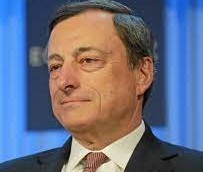21 July 2022
The Anti-Boris
A trip to Italy.
By Neil Tidmarsh.

Had enough of Boris Johnson? Hoping for a completely different kind of prime minister? Dreaming of someone as unlike Mr Johnson as possible? Ok, let’s step through the looking glass and see if we can imagine an anti-Boris, a prime minister who is Mr Johnson’s total opposite:
Boris: charismatic, witty, entertaining. Anti-Boris: dull and boring.
Boris: unreliable, inconsistent, untrustworthy, inefficient, chaotic. Anti-Boris: reliable, consistent, trustworthy, efficient, orderly.
Boris: professional background – journalism (exciting and frivolous). Anti-Boris: professional background – banking (boring and serious).
Boris: an elected member of parliament and leader of his party. Anti-Boris: not a member of parliament, not a leader of a political party.
Boris: prime minister since his party won the last general election. Anti-Boris: a technocrat appointed by the president to lead a government of national unity.
Boris: allegedly uses political donations to fund his personal life. Anti-Boris: forgoes his annual prime minister’s salary.
Boris: his government has a huge majority in parliament. Anti-Boris: his government is a fractious and unstable coalition.
Boris: denounced as one of the worst prime ministers his country has ever had. Anti-Boris: praised as one of the best prime ministers his country has ever had.
Boris: refuses to resign, but his party begs him to go. Anti-Boris: willing to resign, but his president begs him to stay.
An anti-Boris – too good to be true? An impossible dream? Well, no, as it happens. The anti-Boris does exist – he is Mario Draghi, the prime minister of Italy.
Banker, civil servant, professor of economics, Mario Draghi had earned the nickname ‘Super Mario’ even before he became prime minister. Governor of the Bank of Italy from 2006 to 2011, chair of the Financial Stability Board from 2009 to 2011, president of the European Central Bank from 2011 to 2019, he’s widely considered to be the saviour of the euro and the eurozone by his firm declaration in July 2012, at the height of the European sovereign debt crisis, that the ECB “is ready to do whatever it takes to preserve the euro. And believe me, it will be enough.” In 2014, he was eighth in Forbes magazine’s list of the most powerful people in the world; in 2015, Fortune magazine named him as the world’s second greatest leader; in 2021, Politico Europe listed him as the most powerful person in Europe.
When Guiseppe Conte’s government collapsed in January 2021, no political party could agree on a leader to replace him, so President Sergio Mattarella appointed Mario Draghi as prime minister and instructed him to form a national unity government. Incredibly, Draghi managed to do just that, successfully persuading party leaders from the Left, Right and Centre to support him; he appointed ministers to his cabinet from the left-wing Free and Equal party, the centre-left Democratic Party, the centrist Italia Viva, Silvio Berlusconi’s centre right Forza Italia, Matteo Salvini’s right-wing League and even Guiseppe Conte’s populist Five Star Movement.
As prime minister, his handling of the coronavirus pandemic and the global energy crisis, his foreign policy initiatives and his attempts to reform Italy’s judicial system and economy have earned him enviably high ratings from his country’s citizens. Last week, in an episode which offers a curious contrast to what was going on here in the UK at the same time, Draghi didn’t hesitate to offer his resignation when the fractious Five Star Movement withdrew its support and (in his words) broke “the pact of trust and confidence underlying the government” – but President Mattarella rejected the resignation.
Lucky Italy? Well…
Even though the resignation was rejected, the political crisis has triggered an economic crisis – or rather, tipped Italy’s perennial economic crisis into even more dangerous territory. A sell-off of Italian stocks and government bonds followed. Italy’s ten-year bond yield spread with Germany (traditionally seen as a canary-in-the-coal-mine economic warning system for the eurozone) was pushed to above 200 basis points, the level at which ECB intervention is usually required. The crisis has sent Italy’s borrowing costs spiralling ever higher and, given that the country has a 150% debt burden, this “threatens a market meltdown in the eurozone’s third largest economy” (Mehreen Khan, Economics Editor of The Times).
Italy’s crisis is also threatening to become the EU’s crisis; the ECB is expected to raise interest rates this week (for the first time in 11 years) in an attempt to fight inflation and to stave off a looming recession, but this will plunge the indebted economies of other EU countries, not just Italy, into further financial danger. ECB president Christine Lagarde says she is preparing a powerful tool to tackle the problem but it remains to be seen how she might square this circle.
The political crisis is deepening too. Prime minister Draghi will be addressing the parliament today, and there is already talk of another resignation bid and an election as early as this September. Such an election would most likely be won by an unappetising alliance of Silvio Berlusconi’s centre right Forza Italia, Matteo Salvini’s right-wing League and Giorgia Meloni’s hard-right Brothers of Italy. The prospect of such a coalition of anti-EU nationalists must be giving Brussels nightmares.
Draghi’s departure would remove one of Kiev’s staunchest allies from the European stage and threaten Europe’s united front against Russia. More so than his German and French counterparts, he has consistently condemned Russia’s aggression, backed EU membership for Ukraine and supported sanctions and energy price caps. He visited Kiev with Macron and Scholz earlier this month, and the hardening of German and French opposition to Russia and support of Ukraine following that visit may well have been due to Draghi’s influence. The right-wing nationalist parties which threaten to replace his government are, of course, traditionally pro-Russian and pro-Putin.
The point is that parachuting a technocrat into the top political job over the heads of the electorate, however tempting that might be in a country where the democratic process often leads to stale-mate and paralysis, is usually counter-productive. Draghi’s appointment isn’t without precedent, but none of Italy’s other technocratic governments have managed to break the impasse of Italy’s chronic economic and political problems either. Rather than being a solution, technocratic government is a symptom, consequence and even cause of the problem. The rise of anti-establishment parties such as the Five Star Movement, the intransigent coalition partner which deserted Draghi this week, was fuelled by an electorate’s angry reactions against such short-cuts and desperate measures which ignore democratic processes.
The fact is that Mario Draghi is an unelected appointee, undemocratically imposed on his country by an elite. That such a thing should happen in a modern European country, in an EU which prides itself on being the home and refuge of democracy, is rather curious to say the least. When Draghi publicly called Erdogan “a dictator” last year, Turkey’s democratically elected president was quick to point out the irony of this “rude and impertinent” accusation coming from “an appointed and unelected prime minister”.
The question of democracy is in many ways at the heart of the crisis. Draghi’s current emergency has been precipitated by the Five Star Movement’s objection to the strings attached to the EU’s post-pandemic grants and loans, saying that they are undemocratic, the EU dictating terms and policy to national governments (so €200 billion, much needed by Italy, remains in jeopardy). Similar objections may soon be popping up all over the eurozone if the ECB does have to come to the rescue of other indebted economies. As Mehreen Khan points out, “tying ECB money to a resented set of reforms strikes at a fundamental democratic flaw at the heart of the EU’s recovery fund”.
So, if the process of removing and replacing Boris Johnson seems agonisingly slow and the 2024 election impossibly distant, just imagine what the consequences would be if someone in power decided to take a short cut and by-pass the democratic process by persuading the Queen to ride rough-shod over the electorate and appoint Lord King or Sir James Dyson or Gareth Southgate or Dame Prue Leith or any other national treasure as prime minister.


